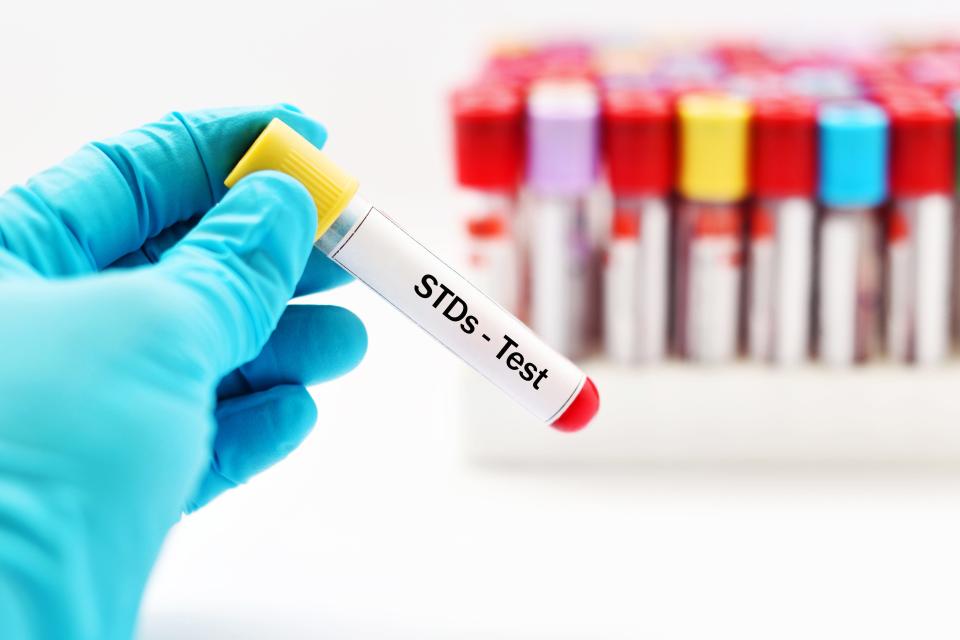Yes, even monogamous couples should consider STD testing. Here's why.
With STD cases on the rise, it's more important than ever for people to get regularly tested – even if you're in a monogamous, long-term relationship.
In 2019 alone, there were more than 2.5 million cases of chlamydia, gonorrhea and syphilis reported, according to the Centers for Disease Control and Prevention— marking the sixth consecutive year of record-breaking cases of sexually transmitted diseases in the U.S.
It's often assumed that only sexually active people with multiple partners are susceptible to getting an STD. While being in an exclusive, serious relationship can limit your risk, it doesn't guarantee you won't contract an infection.
"Everyone should think about having a conversation with their partner around STD testing coming from a place of concern and care," says Savita Ginde, a women's health specialist. "It's crucial for people to believe in the importance of this conversation and thinking of it as an investment in their own health and health of others."
Premium: The swinging community hid in the shadows. Then came #SwingTok.
More: STDs reach all-time high for sixth consecutive year in the US. Is your state in the top 10?
Here's how often to get tested – and why it's crucial
Everyone should get routinely tested for STDs, regardless of relationship status. All sexually active people should get tested at least once a year, according to the CDC. However, Ginde notes that some may choose to get tested more frequently if they have unprotected sex.
And even those in monogamous relationships need routine testing. This is because most STIs, like genital warts, chlamydia, hepatitis and gonorrhea, are asymptomatic, meaning you may not know you have it unless you get tested. Other times, common symptoms like irritation or pain during sex can so be mild that you may not realize it's an STD.
"As a personal recommendation, I think after a couple has had 2-3 annual tests that are negative, they don't necessarily need to test every year. Or they can test at much lower intervals," says Edward W. Hook, a professor of medicine and infectious disease at the University of Alabama at Birmingham.
Millennial therapist: 'Does sex in every long-term monogamous relationship lack excitement? Or is it just mine?'
Ginde adds that STDs are not always results of infidelity, contrary to popular belief.
"It's more common for people to have STIs and not know it … so someone who doesn't know they have an infection can easily pass it onto a partner, who then develops symptoms," Ginde says. "Then, they may assume there was infidelity all of a sudden. Which is why it's very important to have these conversations early on in the relationship."

The dangers of stigmatizing STD testing
STDs are a major public health problem in the U.S., yet they're still stigmatized as something that results from promiscuity. This is partially why many are hesitant to get tested, but experts say this needs to change.
"For more than a century, we've tried to scare people into worrying about STIs, and that clearly doesn't work," Hook says. "Instead, we urge Americans to shift their focus from fear-based to a focus on sexual health, in the same way we check our blood pressure or monitor for diabetes."
This stigmatization is also what prevents many from getting early treatment. A 2021 CDC report found that high levels of stigma and unequal resources contributed to higher STD rates among Black and Latino bisexual and gay populations. According to the data, about 20% of Latino men and 17% of Black men who are gay and bisexual are unaware of their HIV status, compared with 10% of white men who are gay and bisexual.
As a result, untreated STI's can pose serious health problems later on, including sterility, pregnancy complications and pelvic pain, Ginde says.
Am I queer?: TikTok thinks I’m gay. How could it know before I knew?
"Without testing, there can be serious consequences to your health or your loved one's health, so we need to underscore the importance of taking care of yourself, not thinking of it as taboo and having these important conversations."
To normalize routine STD testing in your relationship, Hook suggests framing the discussion with your partner around the importance of health, rather than utilizing blame. This can help the conversation feel less awkward or uncomfortable.
"You can say, 'I care for you. I wouldn't want to harm you or wouldn't want you to harm anything in our relationship," he advises. "One of the great ways to start a relationship is for both members to get tested and share their results, not because they're trying to blame each other, but because they care for each other."
This article originally appeared on USA TODAY: STD cases are rising. Even monogamous couples need routine tests

